牛津上海版九年级第二学期句型转换专题学案设计(含部分答案)
【中考复习】中考英语句型转换教案牛津版
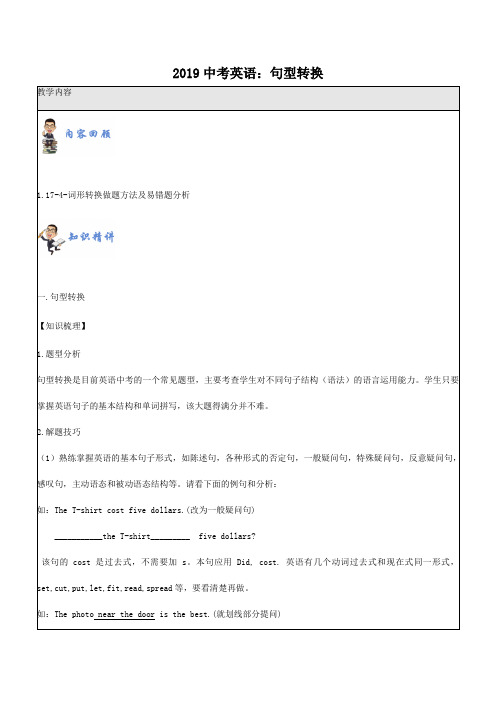
2019中考英语:句型转换教学内容1.17-4-词形转换做题方法及易错题分析一.句型转换【知识梳理】1.题型分析句型转换是目前英语中考的一个常见题型,主要考查学生对不同句子结构(语法)的语言运用能力。
学生只要掌握英语句子的基本结构和单词拼写,该大题得满分并不难。
2.解题技巧(1)熟练掌握英语的基本句子形式,如陈述句,各种形式的否定句,一般疑问句,特殊疑问句,反意疑问句,感叹句,主动语态和被动语态结构等。
请看下面的例句和分析:如:The T-shirt cost five dollars.(改为一般疑问句)___________the T-shirt_________ five dollars?该句的cost 是过去式,不需要加s。
本句应用Did, cost. 英语有几个动词过去式和现在式同一形式,set,cut,put,let,fit,read,spread等,要看清楚再做。
如:The photo near the door is the best.(就划线部分提问)【答案】It is very interesting to make a snowman.【分析】It is very interesting to make a snowman.句型转换1.(上海静安区一模)November 11 is a happy day for them to buy a lot of things.(改为复合句)They are__________ happy on November 11__________ they buy a lot of things on that day.【答案】so|that2.(上海静安区一模)Our laws protect the innocent people in all fields of life.(改为被动语态)The innocent people__________ __________ by our laws in all fields of life.【答案】are|protected【分析】not only do sth but also do sth. 和 do sth and do sth. as well的同义词组搭配转换。
上海市九年级初三中考英语句型转换专练
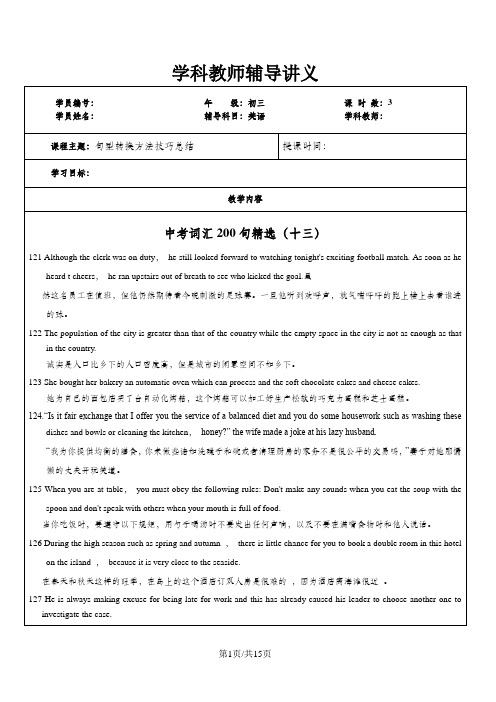
学科教师辅导讲义他老是为上班迟到找借口,导致了他的领导选了另一个人查这个案子。
128 The careless chief hit her face on the glass gate and a lot of blood from her nose dropped on her skirt so her assistant went to find cotton for her.这名粗心的领导一脸撞上了玻璃门,许多鼻血滴在了她的裙子上,因此她的助手去给她找棉花了。
129 There are a variety of furniture and blankets in the palace and a huge swimming pool behind it in the shape of a heart ,The king and the queen used to have a rest on the grass after they swam .在这个宫殿里又各种各样的家具和地毯.而宫殿之后有个心形的游泳池.国王和皇后过去在游泳之后会在草地上休息。
130 In the ordinary course of event ,after he has breakfast,he connects to the Internet to read some business news unless he feels ill .通常说老,吃完早饭之后,除非他感觉不舒服,他会上网阅读一些财经新闻。
一、专题知识梳理知识点1:肯定句、否定句和一般疑问句的转换做题技巧总结:把各种句式归为两大类:1、含有be动词、助动词和情态动词的句子;2、只有行为动词的句子。
总结:第1类句子,肯定句改为否定句时,一律在be动词、助动词和情态动词后加“not”。
改为一般疑问句时,一律将be动词、助动词和情态动前移到句首(首字母大写)。
2022年牛津上海版中考英语句型转换复习资料
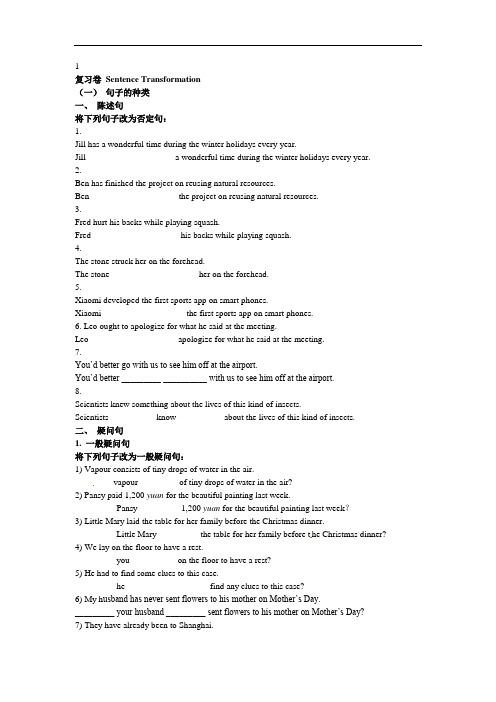
1复习卷Sentence Transformation(一)句子的种类一、陈述句将下列句子改为否定句:1.Jill has a wonderful time during the winter holidays every year.Jill _________ __________ a wonderful time during the winter holidays every year. 2.Ben has finished the project on reusing natural resources.Ben _________ __________ the project on reusing natural resources.3.Fred hurt his backs while playing squash.Fred _________ __________ his backs while playing squash.4.The stone struck her on the forehead.The stone _________ __________ her on the forehead.5.Xiaomi developed the first sports app on smart phones.Xiaomi _________ _________ the first sports app on smart phones.6. Leo ought to apologize for what he said at the meeting.Leo _________ __________ apologize for what he said at the meeting.7.You’d better go with us to see him off at the airport.You’d better _________ __________ with us to see him off at the airport.8.Scientists knew something about the lives of this kind of insects.Scientists __________ know __________ about the lives of this kind of insects.二、疑问句1. 一般疑问句将下列句子改为一般疑问句:1) Vapour consists of tiny drops of water in the air.________ vapour _________of tiny drops of water in the air?2) Pansy paid 1,200 yuan for the beautiful painting last week._________ Pansy _________ 1,200 yuan for the beautiful painting last week?3) Little Mary laid the table for her family before the Christmas dinner._________ Little Mary _________ the table for her family before t he Christmas dinner?4) We lay on the floor to have a rest._________ you __________ on the floor to have a rest?5) He had to find some clues to this case._________ he _________ _________ find any clues to this case?6) My h usband has never sent flowers to his mother on Mother’s Day._________ your husband _________ sent flowers to his mother on Mother’s Day?7) They have already been to Shanghai._________ they ________ to Shanghai _________?8) Jack used to swim in rivers._________ Jack _________ to swim in rivers?9) The Blacks set off for Hangzhou early yesterday morning.__________ the Blacks ___________ off for Hangzhou early yesterday morning?【思考1】哪些词过去式、过去分词的形式是一样的,因此对于时态的判断要尤为关注?_______________________________________________________________________________ 2. 特殊疑问句常考对划线部分提问的特殊疑问词:提问内容例句特殊疑问词对具体时刻提问I will leave at four o’clock.对形容词或副词提问Mary is dancing with Tom happily.2对频度副词提问I work in that charity shop once a week.对距离提问It is 2 hours ride from my home to my school.对数量提问A hundred students are chosen to be volunteers.对年龄提问Tina is twenty-five years old.对时间提问My parents left for Beijing last night.对职业提问My cousin is a doctor.对方式提问We can enlarge our vocabulary by reading morebooks.对多久以后提问The airplane will take off in a few minutes.对多长时间提问I have done my homework since I got home.对次数提问I have been to Beijing twice.对身高提问My brother is 180 centimeters tall.对到多晚时间提问I watched the mov ie until 11 o’clock.对原因提问I slept early because I was exhausted.对特指事务提问I painted the wall with a brush with a long handle.对速度的提问I can run at the speed of 200 meters per minute.对重量的提问Teddy is 45 kilograms heavy.Teddy weighs 45 kilograms.对所属人的提问This cup is Betty’s.This is Betty’s cup.对划线部分提问:1)Doctor Zhang was highly praised for what he has done for his patients.__________ __________ Doctor Zhang highly praised?2)Lily’s mother looks like a film star.__________ does Lily’s mother _________ like?3)My father gets up at six every morning.__________ _________ does your father get up every morning?4)The hospital is about 300 meters away.__________ _________ is the hospital?5)Mr. Brown had to sit down and rest every five minutes.__________ __________ did Mr. Brown have to sit down and rest?6)She’s been to Australia twice.__________ _________ __________ __________ she been to Australia?7)The famous writer Ba Jin was born in Chengdu, Sichuan Province on November 5, 1904. __________ and __________ was the famous writer Ba Jin born?8)The lady sitting beside the secretary works for a big overseas company.___________ __________ works for a big overseas company?9)Students can improve their pronunciation by imitating authentic audio materials._________ can students improve their pronunciation?_________ _________ _________ can students improve their pronunciation?10) Alice’s uncle has had a smart phone for nearly two years._________ _________ _________ Alice’s uncle _________ a smart phone?11) They vacuumed their living room carpet until 2:00 AM in the morning._________ _________ _________ they _________ their living room carpet?12) The new bridge will be built in three months._________ _________ will the new bridge be built?13) It’s about thirty minutes’ drive from our school to Hongqiao Airport._________ _________ _________ _________ from your school to Hongqiao Airport? 14) He drives the car at the speed of 100 miles per hour._________ _________ does he drive the car?15) His luggage weighs 5 kilograms._________ _________ _________ his luggage _________?16) I’d like to play Scrabble since I wan t to enlarge my vocabulary._________ _________ you like to play Scrabble?17) I played tennis with my dad last weekend.__________ __________ you play tennis with your dad?18) About 16 million people live in Beijing now.__________ __________ people live in Beijing now?19) They are required to write a diary in English every other day.__________ __________ are they required to write a diary in English?20) John visited Shanghai Museum yesterday.__________ did John visit yesterday?21) We used to stay in a hotel by the sea on family holidays.__________ __________ you use to stay on family holidays?22) Martin was a taxi driver five years ago.__________ __________ Martin five years ago?23) This dictionary is Tina’s.__________ is this ___________?24) Tom painted the fence with a brush with a long handle._________ __________ Tom paint the fence?3. 反意疑问句将下列句子改为反意疑问句:1) The trip to New Zealand cost him a lot last month, ___________ ___________?2) Jane’s nephew made few mistakes in the exam, __________ ___________?3) Jane’s nephew made fewer mistakes in the exam than me, ___________ ___________?4) Your brother failed the English test last week, ___________ ____________?5) The tourists need a compass to walk out of the forest, _________ _________?6) You needn’t set out so early, ________ ________?7) He’d better stop arguing and learn how to get along with others, _________ _________?8) It’s quite impolite to stare at strangers, _________ _________?9) There is nothing we can do to help her, _________ _________?10) It’s been years since I began my own business, _________ _________?11) Ms. Jones has no interest in collecting stamps, ________ _________?12) There is little money left, _________ _________?13) John’s nephew denied cheating in the English test, _________ _________?14) Your mother has never tried shopping on the Internet, _________ _________?15) I don’t think he will come back before school, _________ _________?16) You don’t think the housing price will keep going up,_______ _______?三、祈使句1. Tell Harry the news when you see him, please. (改为否定句)___________ ___________ Harry the news when you see him, please.2. You mustn’t play football in the street. (保持句意基本不变)___________ __________ football in the street.3. Don’t eat food in class. (保持句意基本不变)___________ __________ __________ to eat food in class.改为反意疑问句:1. Let’s have another try, ____________ ____________?2. Let us have a barbecue, ____________ ____________?3. Tom, take the invitation to her house, ____________ ____________?4. Please don’t close the window, ____________ ____________?3【思考2】在做回答问题时,如What have you learned from the story?或What should he do?,能用祈使句句型来回答吗?若不能,那该用什么句式来回答?请说明理由。
牛津沪教版九年级英语下册语法归纳复习
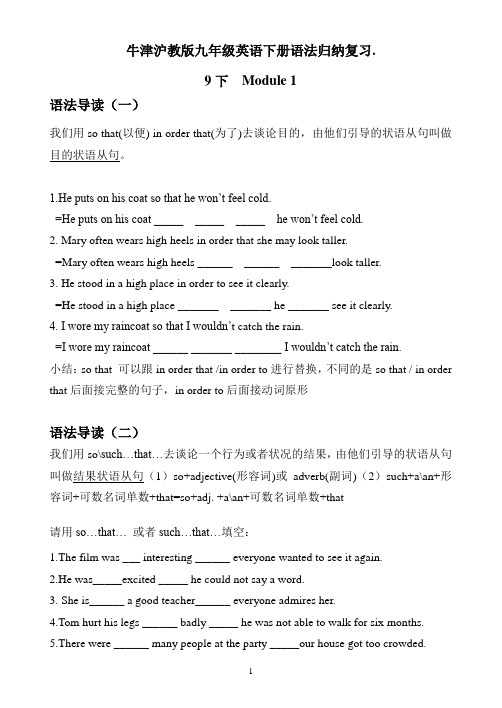
牛津沪教版九年级英语下册语法归纳复习.9下Module 1语法导读(一)我们用so that(以便) in order that(为了)去谈论目的,由他们引导的状语从句叫做目的状语从句。
1.He puts on his coat so that he won’t feel cold.=He puts on his coat _____ _____ _____ he won’t feel cold.2. Mary often wears high heels in order that she may look taller.=Mary often wears high heels ______ ______ _______look taller.3. He stood in a high place in order to see it clearly.=He stood in a high place _______ _______ he _______ see it clearly.4. I wore my raincoat so that I wouldn’t catch the rain.=I wore my raincoat ______ _______ ________ I wouldn’t catch the rain.小结:so that 可以跟in order that /in order to进行替换,不同的是so that / in order that后面接完整的句子,in order to后面接动词原形语法导读(二)我们用so\such…that…去谈论一个行为或者状况的结果,由他们引导的状语从句叫做结果状语从句(1)so+adjective(形容词)或adverb(副词)(2)such+a\an+形容词+可数名词单数+that=so+adj. +a\an+可数名词单数+that请用so…that… 或者such…that…填空:1.The film was ___ interesting ______ everyone wanted to see it again.2.He was_____excited _____ he could not say a word.3. She is______ a good teacher______ everyone admires her.4.Tom hurt his legs ______ badly _____ he was not able to walk for six months.5.There were ______ many people at the party _____our house got too crowded.6.Joy has ______ a strong love of films _____ she goes to the cinema every week.解释句子:1. She is so short that she can’t play basketball well.=She is _____ short _______ ______ basketball well.=She is not ______ enough _____ play basketball well.2. The boy is so young that he can not go to school.=The boy is _____ young _____ go to school.3. He was so angry that he could not say a word.=He was _____ angry _____ say a word.4. It was so noisy that I can’t hear a word.=It was ______ noisy ______ hear a word.5.The comic book is so expensive that he cannot buy it.=The comic book is expensive to buy.小结:so…that…可以跟too…to…或者not…enough to…进行替换语法导读(三)让步状语从句通常由单词although或者though连接.这两个单词可以连接两个相反的或者相对照的描述.改正句子:1. Although it rained, but he ran out without an umbrella.2. Though Jenny heard the doorbell, however she didn’t answer it.3. Though I didn’t know him, but I helped him.小结:although或者though可以转换成but 从句,但是在英语句子中,although\though(虽然)跟but/however(但是)不能同时出现在一个句子里。
中考英语句型转换教案牛津版
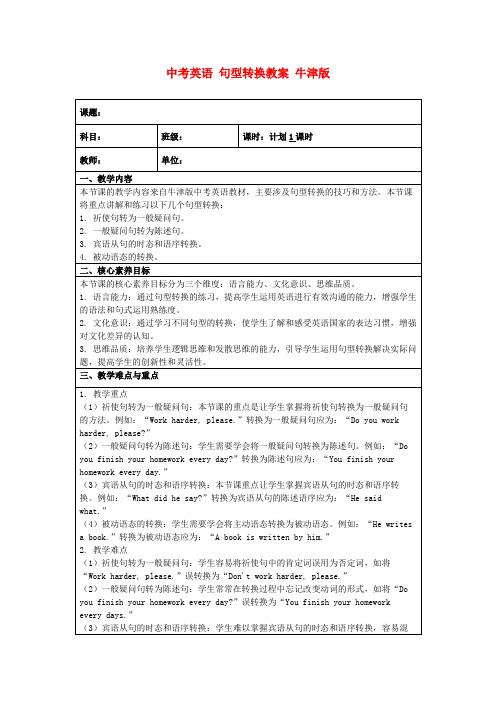
六、知识点梳理
1. 祈使句转为一般疑问句:
将祈使句中的肯定词变为否定词,或将否定词变为肯定词。例如:“Work harder, please.”转换为一般疑问句应为:“Don't you work harder, please?”
2. 一般疑问句转为陈述句:
将一般疑问句中的助动词、情态动词或be动词移至主语之前,其余部分保持不变。例如:“Do you finish your homework every day?”转换为陈述句应为:“You finish your homework every day.”
3. 宾语从句的时态和语序转换:
根据主句的时态,宾语从句的时态相应变化。一般现在时、现在进行时、一般过去时和过去进行时分别对应一般将来时、将来进行时、一般过去时和过去进行时。宾语从句的语序一般为陈述语序。例如:“What did he say?”转换为宾语从句的陈述语序应为:“He said what.”
教师备:
深入研究教材,明确句型转换教学目标和句型转换重难点。
准备教学用具和多媒体资源,确保句型转换教学过程的顺利进行。
设计课堂互动环节,提高学生学习句型转换的积极性。
(二)课堂导入(预计用时:3分钟)
激发兴趣:
提出问题或设置悬念,引发学生的好奇心和求知欲,引导学生进入句型转换学习状态。
回顾旧知:
简要回顾上节课学习的句型转换内容,帮助学生建立知识之间的联系。
三、教学难点与重点
1. 教学重点
(1)祈使句转为一般疑问句:本节课的重点是让学生掌握将祈使句转换为一般疑问句的方法。例如:“Work harder, please.”转换为一般疑问句应为:“Do you work harder, please?”
上海牛津版九年级第二学期词性转换专题复习学案设计

例如:sun→sunny, wind→windy, health→healthy, noise→noisy, luck→lucky,fun→funny
5)“名词+ing"
例如:interest→interesting
6)“名词+n"
例如:America→American, Australia→Australian
9.He would rather be poor than get money in such a(n)________way.(honest)
10.Keep the rules for the public.Be a polite_________. (visit)
keys:1-10 himself; easily; personal; breathe; dishonest; development; careful; invite; dishonest; visitor
7)“名词+ ern"
例如:south→southern, north→northern
8)“名词+ ous"
例如:danger→dangerous
9)“名词+ en"
例如:wood→wooden, gold→golden,wool→woolen
10)“名词+al"
例如:nation→national, education→educational,medicine→medical,nature→natural
4)“形容词+ dom"
例如:free→freedom, wise→wisdom
牛津上海版九年级八大时态专题讲解学案设计(含答案)
二.功能: (1)表现在的事实、状态或动作: eg: ►. Birds fly. ►. She loves music. ►. Mary's parents get up very early. (2)表习惯性动作或职业,常与 often,sometimes,usually,always,every week,seldom, occasionally,frequently 等时间副词连用。 eg: ►. I always take a walk after supper. ►. She writes to me very often. ►. Tom and his girlfriend go out to take a picnic occasionally. (3)表客观真理,格言警句或事实: ►. The earth moves round the sun. ►. The sun rises in the east and sets in the west. ►. Two and two makes four. ►. No man but errs. 人非圣贤,熟能无过。 (4)表将来:
三.时间状语:now, look, listen, at the moment(此时此刻), it’s+时刻,right now,at present,these days,Be quiet!/Don't talk,at 7:30 in the morning(准确的现在时间)
沪教牛津版九年级下册review of units 4-6词句精讲精练(含答案)
沪教牛津版九年级下册review of units 4-6词句精讲精练(含答案)Review of Units 4-6词句精讲精练词汇精讲1. cover(1)cover用作及物动词,意为“覆盖”。
短语cover…with…意为“用……盖住……”,be covered with意为“被……覆盖”。
例如:You can cover the table with the tablecloth. 你可以用台布盖着桌子。
The ground is covered with snow. 大地被雪覆盖着。
(2)cover用作名词,意为“盖子,封面”。
例如:I really like the cover of the book. 我确实喜欢这本书的封面。
2. remain(1)remain用作不及物动词,意为“剩下、留下、待在”,相当于stay。
例如:When the others had gone, Joan remained to clean the room.别人走了,琼留下来清扫房间。
Only a few leaves remained on the tree. 树上只剩下几片叶子了。
The Smiths remained there all through the year. 史密斯一家人在那里待了整整一年。
(2)remain作连系动词,意为“一直保持,仍然处于某种状态中”,后可接多种成分作表语。
例如:Peter became a manager but John remained a worker.彼得当上了经理,但约翰仍然是一个工人。
Whatever great progress you have made, you should remain modest.无论你取得了多么大的进步,你都应一直保持谦虚。
3. think ofthink of意为“想起,记起,考虑,认为”,是动介结构。
think about 与think of均为动介结构。
牛津版上海版九年级下册 Unit 2 life in the future 教案
Unit2Life in the future1教学目标1. 学问及实力目标:扫清阅读中的词汇障碍,初步了解文本特征,依据篇章所供应的信息,答复相关的问题,了解阅读篇章的主旨大意,驾驭标题和找寻支持性微小环节的阅读技能。
2. 方法及过程目标:通过活动,造就学生探究学习、合作学习、自主学习的实力,变更老师一味传授的方式,接受多种活动让学生参及,拉近师生之间的距离,让学生乐于探究,主动参及,学会合作。
通过学生前置作业的布置,开展学生的合作实力和交际实力3. 思想情感目标:1〕通过谈论“将来的生活”的相关话题,帮助学生树立对将来奇妙生活的信念。
2〕结合课文的内容,引导学生通过对将来奇妙生活的描述,鼓舞学生从今时此刻起先努力为将来奇妙的生活奋斗。
2学情分析1〕作为初三年级学生,他们经过2年多的初中阅读课学习,了解了多种阅读技能,如略读、精读、依据上下文推想词义、总结段落大意、通过标题了解大意等,本课时对通过标题了解大意和依据上下文推想词义等阅读技能进展稳固复习,对找寻支持性微小环节的新阅读技能进展教授,能进一步加深学生对它们的理解和运用。
2〕课前学生通过前置作业,驾驭了本课新单词的读音、意思,但尚未在语境中运用。
3〕本班学生具备了必需的视察、自学、合作和解决问题的实力,所以在前置作业中老师布置学生依据单元话题设计将来的一件生活用品和一组同学准备短剧呈现将来的生活情境,在小组合作中为本课的导入局部作好准备3重点难点1. 学及教的重点1〕学生娴熟驾驭重点词语,词组及句型2〕了解阅读篇章的主旨大意,依据篇章信息答复相关的问题。
3〕能运用必需的阅读技能进展阅读。
2. 学及教的难点1〕驾驭和稳固找寻支持性微小环节的阅读技能,并合理运用在阅读任务中。
4教学过程教学活动活动1【导入】Step1:Leading-inStep1:Leading-in1. To arose students’ interest in the future.1. Show two famous characters from the future: Avatar and Doraemon2. Ask students to discuss their names, homes and transportation. Discuss and answer the three questions.Thinking and speaking.2. To present the life in 2050 to the students.1. Ask a group of students to act out.2. Ask some questions.1. A group of stude nts act out a short play about the life in the future2. Answer some questionsListening,thinking and speaking.活动2【讲授】Step2:Pre-reading1. To discu ss the hotels, houses and cars in the future and learn some se ntence patterns. (Ex. B on P 〕Ask questio ns and get the students to use the sentence patterns to answer the questions.Discuss in groups.Use the sentence patterns to answer the questionsThinkingspeakingandgroup work2. To check students’ new words and phrases1. Show some pic tures and ask the students to fill in the blanks with new words and phrases.2. Invi te som e students to write the new words and phrases on the blackbo ard.Write down the new words and phrases with the help of the pictures.Thinking andwriting.活动3【讲授】Step3While-readingStep 3While-reading1. Fas t-read ing: to review the reading skill: title and sub-title (Learned in A8 U ) and get the main idea of the Internet posts.Get the stude nts to have the first reading at a fast speed, and answer two simple questionsScan the story and answer two simple questions.Reading thinking and speaking.2. Detail-rea ding: to teach the students a new reading skill: Finding supporti ng details and get the detail information from the three Internet posts.1. Get stud ents t o learn the new reading skill: finding supporting details.2. Get student s read again and finish the three tables on the handout.3. Check the answe rs with the students by seeking the key words or sente nces.Read the thre e Inte rnet posts for the second time and finish the three table s on the handout by seeking the key words.Reading ,writingand speaking.3. Compre hensio n: to help the students to understand the three Internet pos ts better.1. Get the students to finish exercise D1 on page2. Check the answersFinish exercise D1 and discuss the answers with partners.Reading writingand speaking.活动4【活动】Step4:Post-readingStep4: Post-reading1. To use the new reading skill: finding supporting detail.1. Help the students to discuss and finish the table on the handout.2. Invite some groups to show their work to the whole class.1. In groups,share the pre-class homework, a picture of a future product.2.Find out its char acteristics and supporting details and finish the table on the handout3. Some groups present the picture and the handout to the whole class.Thinking speakingwritingandgroup work活动5【作业】Step6:HomeworkStep 6:HomeworkTo put what they have learnt into practice.Ask the stude nts to copy down a good sentence for each new word or phr aseAsk the students to retell three Internet posts in groups.Ask the students to write an article about the future product. Copy down a good sentence for each new word or phrase. Retell three Internet posts in groups.3. Write an article about the future product.Writing andgroup work。
上海牛津英语2020初三下学期词性转换和句型转换二模考点突破和真题配套训练
上海初中英语单词词性转换汇总表句型转换常考类型同义句转换题是近几年中考英语的一个常考题型,其出题形式通常是同时给出两个句子,第一句完整,第二句中设有几处空格,要求考生填入适当的词或词组,使第二句的意思与第一句意思相同。
它综合考查考生的语法、词汇、短语或习惯用语和句型结构等知识,要求运用所学的词汇、语法知识和句型结构填写句子,使句子结构完整、逻辑合理、语法知识无误、意思与所给句子相同。
通过对近几年的中考英语试题中同义句转换题的分析,我们发现中考英语同义句转换题主要考查以下几个方面:一、运用同义词(组)进行转换用同义词或同义词组对原句中的某些词或词组进行替换,注意转换后的词或词组的词形变化要与句子其他成分相适应。
如:1. That day we could see flowers here and there.That day we could see flowers __________.分析:答案为everywhere。
everywhere与here and there都表示“到处”。
2. The teacher always takes good care of the children in the school.The teacher always_______ ______the children well in the school.分析:答案为looks after。
take good care of与look after…well都表示“好好照顾”。
二、运用反义词(组)的否定式进行转换即用反义词或词组的否定式表达与原句相同的意思,主要考查学生对反义词(词组)的积累和换位思维的能力。
如:1. It’s clear that this visit is different from last time.It’s clear that this visit is not the___ ___last time.分析:答案为same as。
- 1、下载文档前请自行甄别文档内容的完整性,平台不提供额外的编辑、内容补充、找答案等附加服务。
- 2、"仅部分预览"的文档,不可在线预览部分如存在完整性等问题,可反馈申请退款(可完整预览的文档不适用该条件!)。
- 3、如文档侵犯您的权益,请联系客服反馈,我们会尽快为您处理(人工客服工作时间:9:00-18:30)。
She has big eyes with long hair,_________ _________?
三、改为被动语态
中考主要考察五种时态的被动语态:一般现在时、一般过去时、一般将来时、现在完成时、含有情态动词的被动语态。注意时态,人称,单复数的变化。
(1)四个“花费”(spend—take—cost—take)
(2)四个“收到…来信”(hear from—get a letter from—receive a letter from—have a letter from)
(3)四个“给…打电话”(call sb—telephone sb—ring sb. a call—make a telephone to sb.)
e.g. Tom noticed a stranger sing in the building.
A stranger was _________ _________ _________ in the building by Tom.
四、保持句意不变
保持句意不变是可能的形式最多、最复杂的一类变化句式题,涉及到句法、词法多方面的知识考查。
e.g. He gave a present to Tom.
Tom _________ a present _________ him.
3.非延续性动词与延续性动词的相互转换
此类题目要求对一些非延续动词相关的延续动词很熟悉,还要注意时态的变化,通常是一般过去时变为现在完成时,特别注意非延续动词不能与表示一段的时间状语连用。
句型转换专项训练
1、本节内容(presentation)
概述:改写句子是中考英语的一个常考题型,它综合考查考生的时态语态、词汇、短语或习惯用语和句型结构等知识,要求运用所学的词汇、语法知识和句型结构填写句子,使句子结构完整、逻辑合理、语法知识无误。14年的中考当中新加入了连词成句这个新题型,不过近两年考试难度不大。通过对近几年的中考英语试题中改写句子分析,我们发现句型转换题主要考查以下几个方面:
e.g. I may live in this hotel. I may live in that hotel
I may _________ live in this hotel _________ that hotel.
7.运用感叹句的两种句式进行转换
熟记感叹句的构成。
1)How + adj./adv.+主语+谓语!
训练1:填空,使等号左右表达意义一致(一空一词)
say sorry to= ________ ________道歉;
be made up of= ________ ________由…组成
besides A= ________ ________ ________ ________除A以外(还有)
训练2:熟记,完成快问快答测试
(1)Tom joined the Youth League two years ago. →
He________________ inthe Youth League for two years/since two years ago.
常见的非延续性与延续性动词之间的转换:
leave→ be awayborrow → keepopen/close sth → keep sth open/closed
2)What + a(an)+ adj.+单数名词+主语+谓语!
What + adj.+复数名词/不可数名词+主语+谓语!
e.g. The beach is a nice place for tourists. (改为感叹句)(2011)
_________ _________ nice place the beach is for tourists!
五、改为宾语从句
即将直接引语变为间接引语或将间接引语转换成直接引语。此时还要注意相关时态、人称、动词、状语等相应的变化。如:
1. “I’ve found my wallet,” he said to me.
Hetoldme that he _________ _________ his wallet.
e.g. Our school organizes an English speech contestonce a year. (对划线部分提问)(2011)
_________ _________ does your school organize an English speech contest?
(1)We can't finish the whole work on time if you don't help us. →
_________ your _________, we can't finish the whole work on time.
We can't finish the whole work on time _________you________us.
3.改为反义疑问句(注意有have的反义疑问句)
e.g. Your mother has never tried shopping on the Internet. (改为反意疑问句)(2010)
Your mother has never tried shopping on the Internet, _________ _________?
用How加形容词/副词来提问时中考常考的类型,注意区分各种搭配下的意义用法区别。
e.g. Tom will finish his workin 3 hours. (对划线部分提问)
_________ _________ will Tom finish his work?
常考的考点:
how long/soon/ far/often, how much/ many的区别;
e.g.It’s clear that this visit is different from last time.
It’s clear that this visit is not the_______ ______last time.
有的反义词即使不与否定词连用,而只需改变句子结构也可构成同义句。
e.g. We have used the underground for 3 years.(变为被动语态)
The underground _________ _________ _________ by us for 3 years.
【注意】在使役动词have, make, get以及感官动词see, watch,定式to要省略,但变为被动结构时,要加to。
4.简单句与复合句之间的转换
即将简单句变成同义的复合句或将复合句变成同义的简单句。此类题目需要熟记一些重要的句型和短语。例如:too... to; so... that ; enough to...等之间的转换,without短语与if/unless条件状语从句的转换,还有not...until....等句型。
5.祈使句+and/or与if条件状语之间的相互转换
(1)Listen carefully, or we’ll miss some important information.
_________ we _________ listen carefully, we’ll miss some important information.
9.利用某些典型句式或结构进行转换
这类典型结构如so…that…,too…to…,enough to,not…until…,so do I等
(1)I find that it is hard to get up early in the morning.
I find _________ _________ to get up early in the morning.
一、改为否定句
e.g. Fred plans to work in the charity hospital in the community.(改为否定句)(2013)
Fred __________ _________ to work in the charity hospital in the community.
六、综合类
综合类题目设计的变化类型也比较多,归纳起来主要是三种形式变化:合并句子,简化句子,变化形式等。
七、连词成句
解题技巧
1.基本句型记心间
题干若有what等“wh-word”时,我们一般要考虑特殊疑问句或感叹句;如果含有辅助动词、系动词或情态动词时,要考虑一般疑问句。
【典例分析】an, this, story, interesting, is答案:Is this an interesting story?
1.运用同义词(组)进行转换
用同义词或同义词组对原句中的某些词或词组进行替换,注意转换后的词或词组的词形变化要与句子其他成分相适应。如:
(1)I want to be an astronaut. I believe I will achieve my dream.
I want to be an astronaut. I believe my dream will _________ _________.
二、改为疑问句
1.改为一般疑问句
e.g. The new product consists of four main parts inside. (改为一般疑问句)(2012)
_________the new product_________of four main parts inside?
